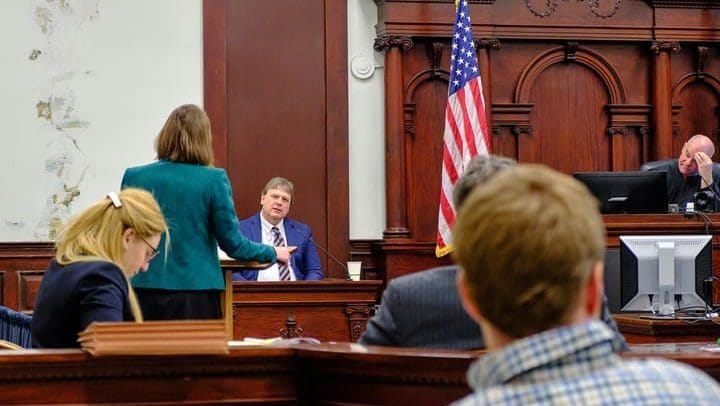By Eric Dietrich for Montana Free Press

This story is adapted from the MT Lowdown, a weekly newsletter digest containing original reporting and analysis published every Friday.
For nearly two months, Montana Free Press has been one of several Montana media outlets involved in a lawsuit where we’re pushing to maintain long-standing public access to the Legislature’s bill drafting “junque files,” which contain a variety of correspondence between lawmakers, lobbyists and legislative bill drafters about proposals they’re preparing for introduction.
As we’ve written previously, those files were treated as public documents for decades — long enough that nobody can seem to remember where the “junque” title came from — before legislative attorneys reversed that policy last fall.
An initial victory for us in our case on January 21, though, cleared the way for the release this week of several junque files I had requested in October. (Full disclosure: Our attorneys called me to testify at a court hearing earlier this month.)
One of those files I received illustrates precisely why I believe the drafting materials should be readily accessible to the public.
The file involves a bill draft requested by Senator Wendy McKamey, R-Great Falls. Until this week, all I knew about the potential legislation was its short title: “Provide property tax exemption for wireless infrastructure.” A heavily redacted version of the draft’s junque file released to me in October hid information that would have told us more — including the name of a lobbyist who, at McKamey’s request, was developing the bill with a staff drafter.
The release of the full file this week revealed the lobbyist is Mark Baker.
Baker, if you don’t happen to recognize his name, is one of the Montana Capitol’s most prolific lobbyists. He was part of a team that lobbied the administration of Governor Greg Gianforte and a legislative advisory commission on behalf of Charter Communications during a 2021 and 2022 process that resulted in Charter being awarded $110 million in broadband grants from Montana’s allocation of American Rescue Plan Act dollars. Disclosures on file with the Montana Commissioner of Political Practices indicate Baker is currently representing at least 29 separate clients before the Legislature, including private prison operator CoreCivic, Airbnb, Exxon Mobil, Charter and wireless carrier AT&T.
Baker declined to comment on the bill draft this week, saying he needed authorization from AT&T.
The newly released file also includes draft language that provides specifics about what the potential bill could do. That text indicates the legislation would let wireless infrastructure like cell towers qualify for a 10-year property tax exemption the 2021 Legislature authorized for newly built wired broadband lines, a measure supporters said would encourage telecom companies to build out their Montana networks. The new bill would also strike a part of the 2021 law that prevents the original broadband tax break from applying to wired infrastructure built with money from the American Rescue Plan Act. Both changes would appear to lower tax bills for Baker’s clients.
A similar bill nearly passed the 2023 Legislature before being caught up in a late-session procedural dustup. A fiscal analysis of the 2023 bill estimated the tax break would apply to about $23 million a year in new wireless infrastructure, shifting the taxes its owners would have paid onto other taxpayers.
McKamey said in an interview Thursday that she hadn’t yet read the draft bill text or decided whether she’ll introduce it. She also said Baker had approached her about the bill concept.
“It was proposed to me as boosting broadband — and it does that,” McKamey said. “And that’s not a terrible thing when you think about it, especially when you live out in the country like I do.”
To be clear, this is all fairly run-of-the-mill legislative sausage-making. As legislation is developed, it’s common for Montana lawmakers to connect staff bill drafters with lobbyists, who often have topic-matter expertise. It’s also common for business interests to argue that the public would be well-served by offering them a tax exemption — and common for the merits of those arguments to be debated as bills move through the Legislature.
In this instance, however, that sausage-making happens to involve tens of millions of dollars of connectivity infrastructure, one of the Capitol’s super-lobbyists, the financial interests of at least one national telecom company and, potentially, your personal property tax bill. All that gristle — which seems to me to have obvious public interest — is only visible to the Montana public right now because we’ve gone to court to get our hands on the measure’s junque file.
Some of that information would eventually be disclosed elsewhere if McKamey chooses to introduce the bill, which would then be subject to a succession of public hearings and legislative debates as its backers push it toward the governor’s desk. As of this writing, though, the draft’s page on the Legislature’s official website includes a grand total of 40 words.
As reporters covering the Legislature, we have a variety of tools that we can use as we work to help you, our readers, understand what’s happening at the state Capitol — ranging from public proceedings to official databases to emails from helpful tipsters. Junque files, particularly when bills are being formed behind the scenes, are a vital part of that toolbox.
I’m grateful that, at least so far, the courts seem to agree.



